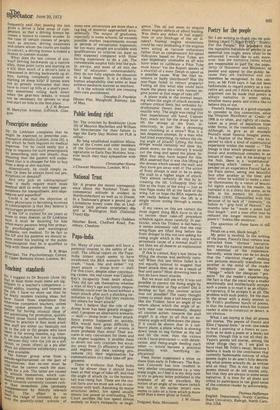Tea c hi ng standards S ir: 1 suggest to Dr Boyson (June 16)
that at least three main items are sig. Mficant to a teacher's competence 7 Titial ability, training, and interest in the job. I have no more use than he L°1' many modern training ideas, but ?eve found from experience that otherwise competent teachers, unless under undue pressure from an insPector for having unusual ideas of self-advertising for promotion, quickly discard those found ineffective. More serious in practice is that most avail!,,bie staff are either (a) basically not ;'..P, to the job or (b) people who have suKe.n it for wrong reasons, e.g. interst in the subject but not in teaching 'because they view the job as a soft °Ption, or (most often) as a pis alter . en no alternative satisfactory care'r was available. The former group arise from a Peseudo-egalitarianism on the part of tdl-leationists, that no-one must be 1z1 that he cannot reach the stanbards for a job. The latter are caused jschools themselves, which con antlY press their more talented stu.'-'its towards university courses rather than immediate jobs (probably MnPlemented by directly relevant study). The effect Is to it the range of interests; for not even the quaintly-titled 'schools '. of
some new universities are more than a rag-bag of material approached accademicalIy. The output of graduates, especially in some schools, far exceeds possible market requirements except at periods of exceptional expansion; far too many people are available with qualifications to criticise (at least so they suppose) compared with those having experience to do a job. The considerable surplus falls into the public service, and most of all into the field of education; understandably, they do not fully explain the situation to a head master. It is a tribute to. human adaptability that some at least achieve mediocre success as teachers.
It is the schools which are creating their own punishment.
Douglas D. Franklin Dhoon Plat, Maughold, Ramsey, Isle of Man.


































 Previous page
Previous page